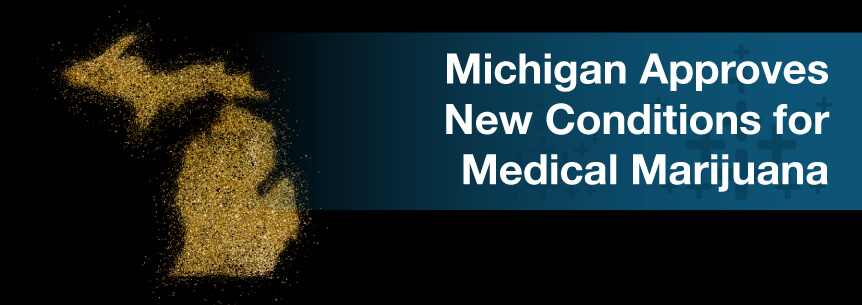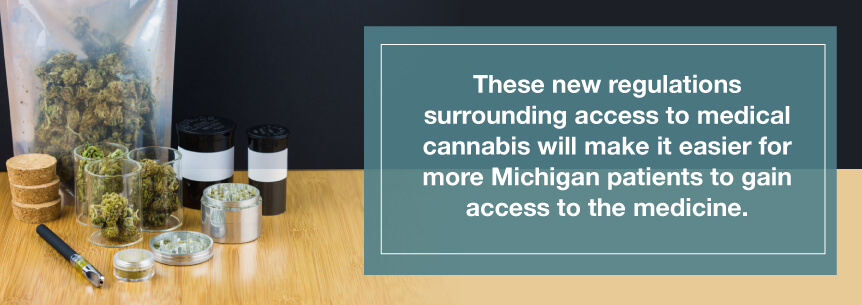
Continued research about the efficacy of medical marijuana as a treatment option has banished many of the stigmas the plant has carried for decades. More than half of the states in the U.S. have recognized its myriad of healing properties and legalized it for medicinal purposes for several medical conditions and adverse symptoms. Back in 2008, Michigan approved medical marijuana legislation. In just two years, the state’s program exceeded 100,000 patients.
This strong and active medical marijuana scene has led many patients who did not meet the initial 2008 qualifications to call for extended access to more of those with debilitating conditions. The state government seems to have listened.
In July 2018, the director of Michigan’s Department of Licensing and Regulatory Affairs (LARA), Shelly Edgerton, approved adding 11 new disorders to the state’s list of debilitating medical conditions adopted in the Michigan Marihuana Act. Unfortunately, this approval was bittersweet, as another 11 disorders were denied and not added to the list of qualifying conditions.
Throughout April and May 2018, Michigan citizens submitted petitions and comments to the state’s Medical Marihuana Review Panel. They requested that Michigan extend the list of qualifying conditions to include even more debilitating conditions. The review panel made an extensive list of recommended disorders and presented them to Director Edgerton for consideration. Edgerton has complete control over the approval or denial of all LARA’s departmental actions.
In the end, she added 11 new conditions. However, Edgerton also denied an extensive list of disorders based on the recommendation of the review panel. Even though there is supporting evidence that shows medical marijuana as an effective treatment, conditions such as depression, anxiety, diabetes and asthma, among others, were not added to the approved list.
However, with a newly expanded list, Michigan patients should be aware of which conditions now qualify for medical marijuana access within the state. Effective immediately, patients can visit their physician to receive a recommendation for medical cannabis use if they have the following health disorders:
Initially, Michigan’s medical marijuana laws only allowed patients with certain severe, debilitating or life-threatening medical conditions to qualify, such as cancer, HIV, glaucoma, Hepatitis C, ALS and a few others. However, these new regulations surrounding access to medical cannabis will make it easier for more Michigan patients to gain access to the medicine. Not only will this provide more people with much-needed relief, but it also continues to legitimize marijuana as an appropriate therapeutic option.

Although the above conditions were the only new ones Edgerton approved, for now, Michigan patients whose disorders did not qualify are still hopeful the government will reconsider them in the not-so-distant future.
Legalized medical marijuana has had its ups and downs in Michigan. The state has seen a considerable number of patients receive legitimate therapeutic benefits thanks to the herb. It’s also witnessed advancement in marijuana research over the last decade. This has allowed the state’s medical cannabis program to grow and expand according to patients needs, even allowing the law to include marijuana-infused products.
Despite this, Michigan lawmakers have continually attempted to crack down on legalized medical marijuana by imposing new rules and regulations. At one point, many patients were afraid lawmakers would begin shutting down dispensaries throughout the state because they claimed concern that there were too many.
The authorities seeking to shut dispensaries down faced off against medical marijuana activists, including patients, lawyers and local business owners who have seen positive results thanks to the local medical cannabis industry. In the end, Michigan opted to allow all dispensaries to remain open.
However, opposition from lawmakers did result in a more recent change. LARA announced that dispensaries were banned from using more than a dozen words in conjunction with their business, one of which was the word “dispensary.” For that reason, patients in Michigan who wish to access medical marijuana within the state must visit local “provisioning centers.”
Despite substantial opposition, advocates are still seeking legalization beyond medical marijuana. The debate over legalized recreational cannabis has been going strong for many years. However, residents may see a positive change in this direction soon.
In April 2018, Michigan’s State Board of Canvassers determined there was enough support for the complete legalization of marijuana to include a proposal on the upcoming fall ballot. State lawmakers were given 40 days to raise objections to this proposal. However, that deadline came and went in June 2018.
This means that a legalization initiative may be on the ballot as soon as November 2018, which would allow Michigan residents to finally have a say on whether recreational weed should be legalized. Recent data suggests the proposal would pass, as the majority of Michigan natives are in favor of access to marijuana.
If you are a Michigan resident with one of the state’s qualifying conditions, then you can register with the Michigan Medical Marijuana Program to get a medical marijuana card. But first, you must establish and maintain a bona fide relationship with a physician in your state. It’s their job to ascertain whether or not you have one of the approved qualifying conditions, as well as certify that they believe you would benefit from the medical use of marijuana. Getting a physician’s recommendation is mandatory in Michigan.
If you believe your health issue qualifies you for medical marijuana use in Michigan, make an appointment with a medical marijuana doctor near you. A licensed health professional can discuss all the options available and help you gain access to your state’s program. We invite you to browse our database of approved marijuana doctors to find a physician near you.
No Information on MarijuanaDoctors.Com should be used to diagnose, treat, prevent or cure any disease or condition. You can view our Full Disclaimer here.